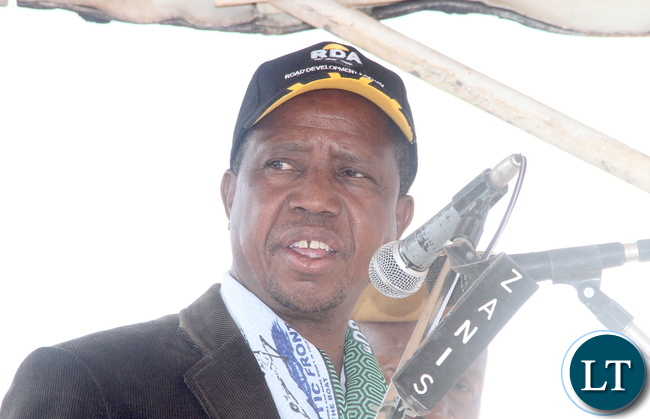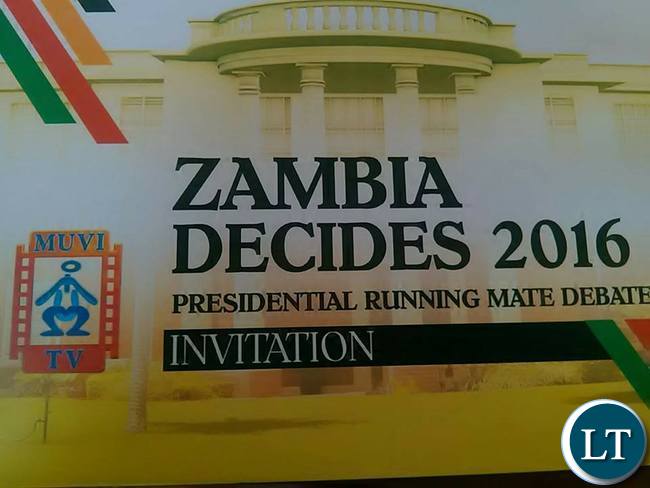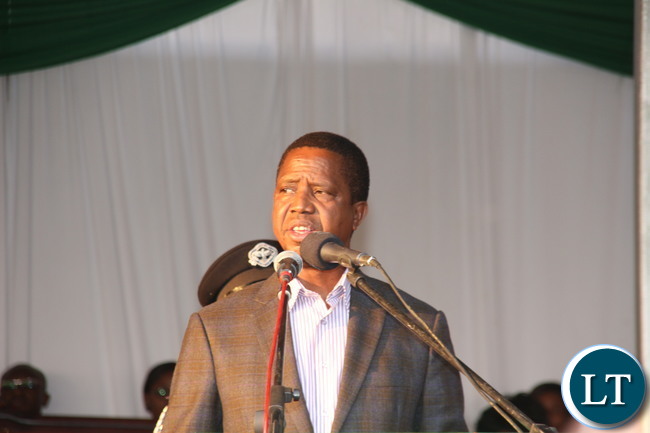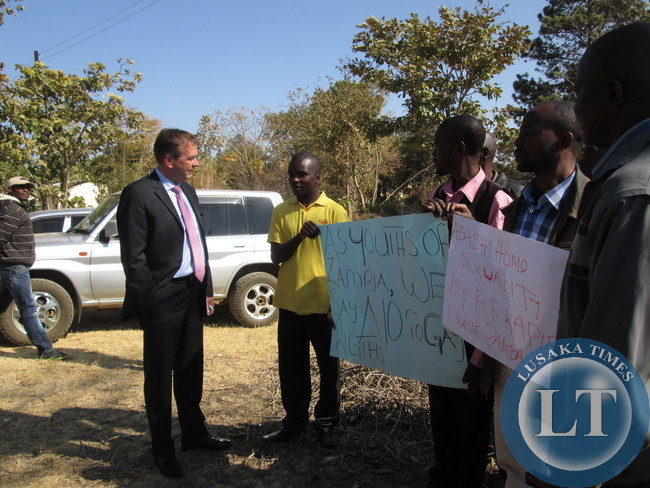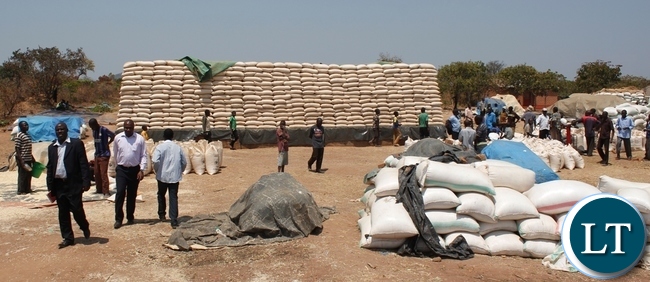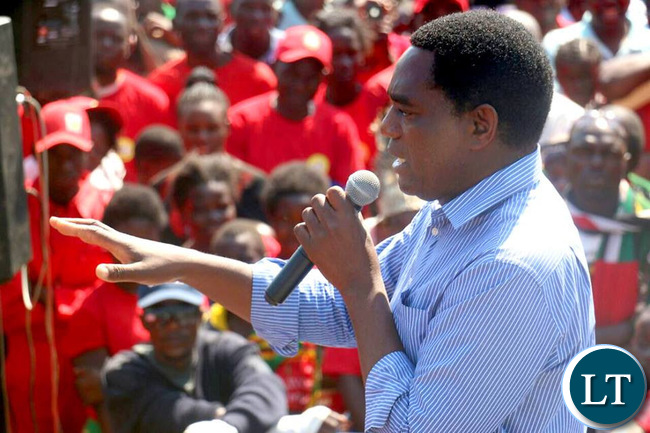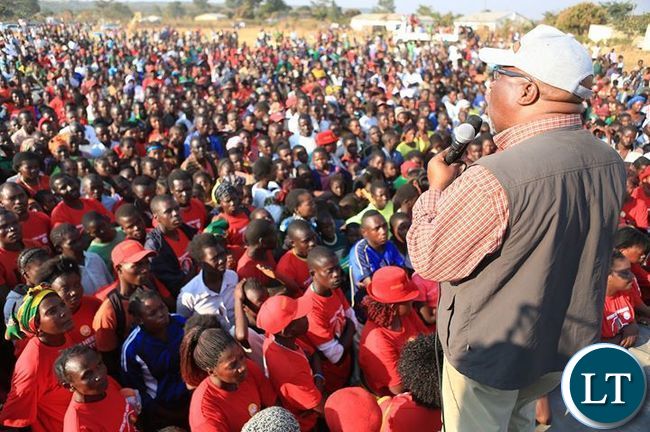
Inspector General of Police Kakoma Kanganja has revealed that an inquiry file has been opened over a Post Newspapers front page story which showed five men wearing police officers and posing with UPND campaign posters.
The story headlined Cops Protest alleges that about 22 police officers sought to be interviewed at a private location and five of them volunteered to be photographed displaying UPND posters, saying the police was the most affected government institution by the PF abuse.
The story further alleges that the police officers said they are sick and tired of this stupid abuse of officers by PF cadres now where our superiors cannot even defend professionalism in the police service anymore and that they have since joined the UPND Operation Watermelon, describing it as a protest move against their abuse by the PF government.
But Mr Kanganja told a media briefing in Lusaka today that the Zambia Police Service has never been partisan and will always remain impartial.
“It is in this regard that I am urging all peace loving Zambians to desist from bringing Police officers into politics. I am referring to today’s post newspaper edition No 7221 which has paraded purported Police officers supporting a political party. An inquiry file has since been opened,” Mr Kanganja said.
“I therefore, wish to assure all Zambians of our commitment to a peaceful, fair, credible and violent free election. Let the people of Zambia have trust and confidence in the Police. This is their institution mandated by law to protect life and property, preserve peace and maintain law and order, Ensure the security of the people of Zambia and Up hold the bill of rights.”
And Mr Kanganja has disclosed that the assertions by UPND senior officials namely Mr Garry Nkombo and Ms Silvia Masebo and the Post Newspaper of foreign nationals having been registered by the Electoral Commission of Zambia as voters have been found to be false.
He said on 13th May, 2016 a report was made by Mr Nkombo and Ms Masebo at Woodlands Police Station to the effect that over 500,000 foreigners had been registered by the Electoral Commission of Zambia (ECZ)as voters.
Mr Kanganja said this according to their claim was a ECZ calculated act to rig the elections in favour of the Patriotic Front (PF).
“On 5th July,2016 the Nation would recall that the Post newspaper edition No 7200 carried a story with a headline “ECZ SOURCES EXPOSE GHOST VOTERS” in which the paper published 207 names of people purported to be foreigners but registered as voters by ECZ. The edition indicated that 178 were Malawians while 29 were Tanzanians,” he said.
“Considering the seriousness of the allegations as made by Mr Garry Nkombo and Ms Silvia Masebo and a story carried in this edition of the post newspaper investigations were instituted. After thorough investigations the 207 names as published in the post newspaper Edition No. 7200 have been found to be Zambians nationals from Chief Chanje Chiefdom Rukuzye ward in Chipangali constituency.”
He added, “To our great disappointment the details of the people published in the post newspaper edition were collected from residents of this same ward by the village Headwoman Katamanda whose real names are Alaina Phiri after being engaged by two women who were introduced to her by headman Mbobo, whose real names are Mr Tumeyo Mbobo Phiri a UPND chairperson for Rukuzye ward in Chipangali Constituency after being promised to be paid K2500 after the task of which a down payment of K500 was made. The Headwoman thereafter engaged two of her subjects Mary Manda and Lena Nkhoma to execute this task.”
He said when approached by the investigation team Headman Mbobo acknowledged having introduced two women who were later identified as Mrs Caroline Zulu Munyumbwe and Mrs Chona Malata both teachers at Katete Primary School who were conducting voter sensitizations workshops for the UPND at a church building in Mafuta Village, to Village Headwoman Katamanda.
“The investigations team further interviewed the people from whom voters cards were collected and their details of National Registration Cards were compared as also found in the provisional voters register for Chipangali ward Constituency and were found to be the same.”
Mr Kanganja said arising from the findings of this exhaustive investigation, Headwoman Katamanda Alaina Phiri and Headman Mbobo Tumelo Phiri have since been charged and arrested.
He said the duo were arrested and jointly charged for the offence of illegal practices relating to the poll, Contrary to Section 87 (1d) and Section 88 of the Electoral Process Act No. 35 of 2016 as read together with Section 21 (1c) of the Penal Code Act Chapter 87 of the Laws of Zambia.
“The duo appeared in court on Friday 22nd July, 2016 and are remanded in custody. A man hunt has also been launched for the two female teachers currently on the run. As regards to the 29 Tanzanians allegedly registered as voters by ECZ our investigations have established that they are Zambians registered as voters in Mbala and Mpulungu.”
He said the assertions by Mr Nkombo, Ms Masebo and the Post Newspaper of foreign nationals having been registered by the ECZ as voters have been found to be false.
“We are warning people involving themselves in such illegal practices that they risk being arrested and prosecuted in accordance with the Law. All those that could have participated must surely know that the long arm of the Law will eventually catch up with them and they shall be brought to book as their action has the potential to compromise the security of our nation.”
And on the shooting of a UPND female cadre identified as Mapenzi Chibulo on 8th July,2016, Mr Kanganja said investigations are still ongoing.,
“I wish to once again regret the loss of life and wish to inform the nation that this is a serious matter that requires thorough investigation. The investigations are still ongoing and at an opportune time the nation will be accordingly informed. I would like to appeal to all citizens of Zambia to shun violence and remain peaceful before, during and after elections.”



